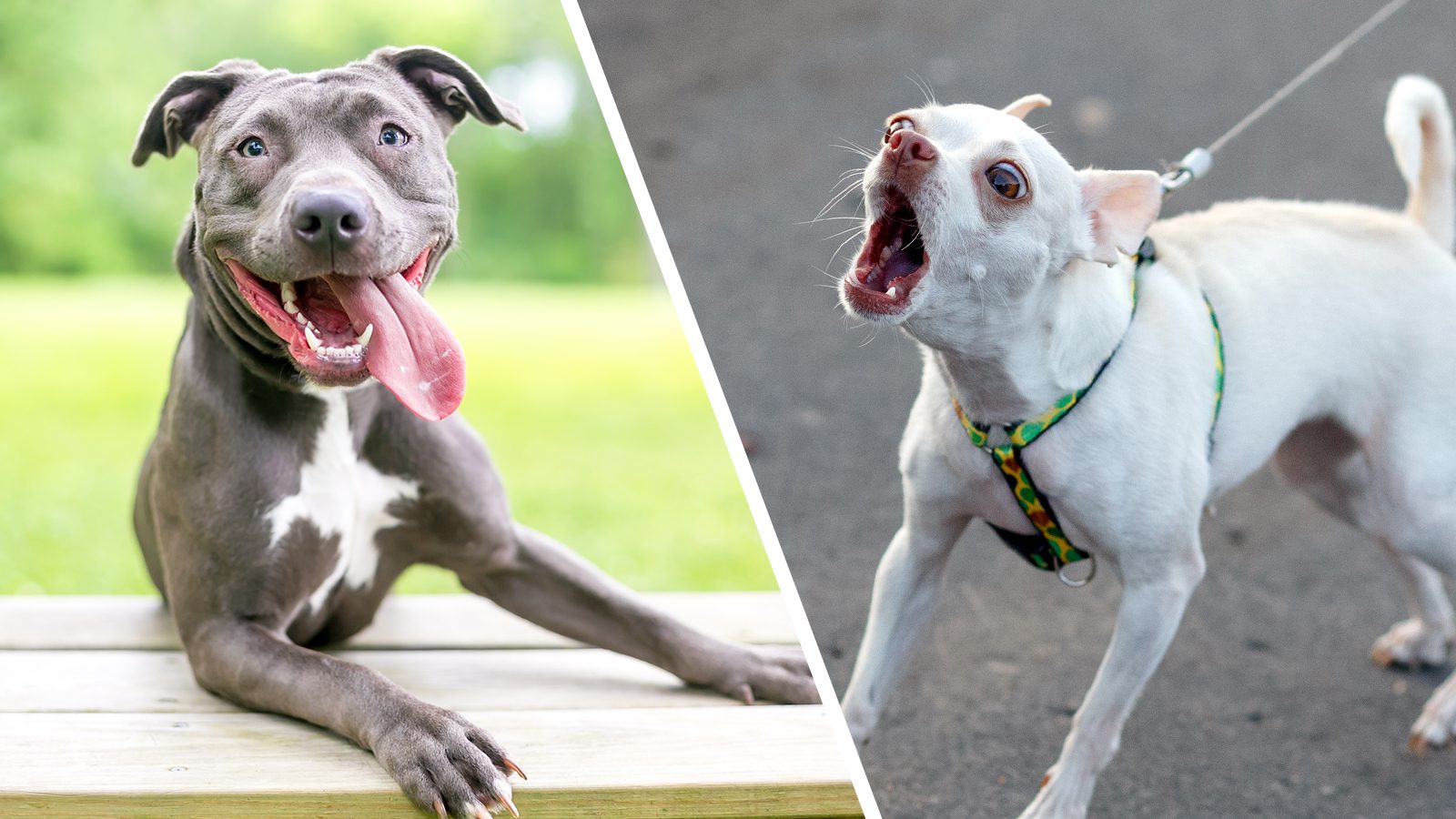Everybody has their favorite dog breed. You may love a particular type for its characteristic temperament and personality. It turns out that the dog behavior you admire in your pooch may not be typical of their breed. Vets now say each individual dog behaves differently, and it does not directly link to breed.
How does dog behavior connect to breed?
Breeding dogs became popular during the Victorian era, approximately 150 years ago. Since then, certain breeds have become popular based on what people considered their temperament.
For instance, “friendliness” is often associated with certain breeds, like a Labrador Retriever. But another dog breed, like a Pit Bull, that could be just as friendly, has an unfairly bad reputation. For instance, many view American pit bull terriers and Staffordshire terriers as aggressive. Conversely, they see English bulldogs as calm and friendly. A better criterion to describe a dog, the researchers say, is their physical characteristics such as color, fur quality, size, or ear shape rather than whether the breed is friendly.
Senior author Elinor Karlsson, Ph.D., associate professor of molecular medicine at the University of Massachusetts, says:
“While genetics plays a role in the personality of any individual dog, specific dog breed is not a good predictor of those traits.”
Her study surveyed a little over 18,000 dogs, half purebred and mixed breed. They found different dog behaviors did not stem from the breed. There were similarities in the same breed. But overall, the breeds weren’t predictive for individual dogs. Traits could more closely connect to genetics or environmental factors. Surprisingly, researchers found pit bulls were as comfortable and social around people they didn’t know as retrievers.
Which breeds do not get adopted due to dog behavior myths?
This tendency to view certain dog breeds as friendly or aggressive behavior often plays out at animal shelters. Because of prejudice, certain canines are less likely to get adopted. But researchers say it’s best to judge a dog individually. You can accept them as excellent adopted pets if you see them with unique personalities. The breeds that don’t get adopted as often in animal shelters include the following:
-
American Pit Bull Terriers:
It’s the breed you often find in high number shelters. These famous dogs often get misused or abused. Some localities ban this dog breed from certain housing areas. Pit bulls are generally athletic, loving, and loyal dogs that deserve love.
-
Labrador Retriever:
Even though this dog breed is considered friendly, you find many of them in shelters. Labs are high-energy and fun-loving. Perhaps people see them as too much work. Whatever the reason for the increased numbers of labs at shelters, they make lovely family pets.
-
German Shepherd:
Similar to a pit bull, shepherds get a bad rap. They’re excellent guard dogs, but people shy away when they see these dogs at shelters. It’s an active breed but very loyal to its humans.
-
Beagle:
Second to the pit bull, many beagles and beagles mix dogs in animal shelters. These sweet dogs get a bad rap because they need lots of exercises and they’re hunters. They have a characteristic mournful baying bark, but not all beagles are prone to this as sometimes thought.
-
American Bulldogs:
These dogs are part of the bull breeds. They’re athletic and loyal to their humans. Some jurisdictions have banned this breed, similar to the restrictions put on pit bulls. You’ll see a lot of bulldogs at animal shelters. Past owners often abused them, making them more unpredictable, but many people love this breed.
Of course, there are some differences among dog breeds. If you adopt a Border Collie, it will probably be easier to train than a Great Pyrenees. This usually has something to do with their genetic makeup.
What dog behavior and personality traits do people value?
People like certain personality traits or dog behavior. This makes the dog more acceptable to them. Things that people say they look for in a dog include:
- Easy to teach
- Friendly
- Good with kids
- Cuddly
- Energetic
- Protective
- Loyal
Remember, each dog’s personality traits can vary depending upon an individual dog. So, even if you get a dog breed you think is friendly, the individual dog may be affected by how it’s been trained, treated, and environmental factors. One study found that only 9% of dog behavior can be accredited to breed. The dog breed is often a poor predictor of a dog’s behavior. This shouldn’t be your main criteria for selecting a dog as your pet.
Is your dog similar to you?
Researchers say a dog mirrors their owners. Because dogs are sensitive to their human emotions, they may reflect these emotions. When you’re relaxed and friendly, your dog will act this way. Your dog will mirror this behavior if you struggle with anxiety and negativity. Interestingly enough, dogs and humans affect one another. A calm dog helps humans to relax and cope better with stress.
How to choose a dog from a shelter
So, you should not judge a dog by its breed. So how do you choose a dog from the animal shelter? Here are dog behavior and personality to look for at a shelter.
- Relaxed body language: They’re not shaking or nervous. They seem relaxed and calm when you approach. This shows a dog isn’t afraid of humans.
- Friendly: They come over to you in a welcoming way. They are eager to be petted. This shows they are friendly around humans. It could also show they trust humans because they haven’t been abused.
- Playful or energetic: A playful, happy dog is a healthy dog. They should be energetic but calm at the same time. Some dogs are less active, but playfulness is a key indicator they’re healthy and happy.
- Eye contact: If a dog makes eye contact, they’re already bonding with you. It’s a meaningful experience.
- Roll over on their backs: This shows a submissive-natured dog. They do this to show you they trust you and want a tummy rub.
- Tail wag: This indicates the dog is happy to see you. A dog with its tails down shows fear. A wagging tail tells you they’re excited to see you.
- Licking: If you meet a dog wanting to lick you, they show affection.
- Cuddling: If you get to hold a dog at the shelter, the ones that want to cuddle indicate an affectionate puppy.
- Jumping: Although jumping isn’t perfect dog behavior, jumping could mean the dog likes you if you’re looking for a dog at the animal shelter. This is a physical demonstration of an affectionate personality.
If possible, try to spend some time with the shelter dog. Watch for these dog behaviors as you decide if they’re the right dog for you.
Why is your dog’s breed necessary to consider?
If a dog’s breed isn’t a good indicator of dog behavior or personality, why is knowing their dog’s breed helpful? A dog breed isn’t always the thing that tells you where you’ll be happy with a dog, but it can guide you to what type of dog will be best for your life situation.
- Health issues: Breed information helps set expectations about what a particular dog might need to stay healthy and happy. For instance, Pugs are known to have breathing issues. Great Danes are prone to autoimmune diseases. Knowing a dog’s breed helps you understand what health problems they could be prone to so you can better care for them.
- Size: You can’t turn your Dachshund into a Chihuahua. You can’t assume you can carry a Doxie around in your purse like you would a Chihuahua. If you want a small dog, be sure it will stay small throughout adulthood.
- Energy level: Even if you view your dog as unique to its breed, you shouldn’t choose a dog that loves to hunt and chase to live in a small apartment.
- Lifespan: Your dog’s lifespan is affected by its breed. Knowing how long your dog will live is helpful to see if you’re pushing too much.
- Drive: Certain breeds do tasks while others don’t. Your cattle dog may nip at your kids’ heels to control them. Allowing for proper outlets related to your dog’s drive helps them stay happy and content.
Final thoughts on how little breed impacts dog behavior
The dog behavior and breed relationship aren’t as high as most people expect. Dogs have different personalities and environmental experiences that may dictate their behavior. Even dogs of the same breed will have distinct personalities. Owners also dictate canine behaviors. Dogs mirror their owners. They pick up an owner’s anxiety and fear. There is a considerable variation between dogs, even though they look the same. So, don’t judge a dog by a stereotypical view of its breed. The breed is essential to help you choose a dog that is the right size for your home. If you are allergic, you don’t want to pick a dog that sheds. So, although you shouldn’t discount a dog’s breed, don’t let it be the only criteria for choosing a specific dog.

















 Community
Community

